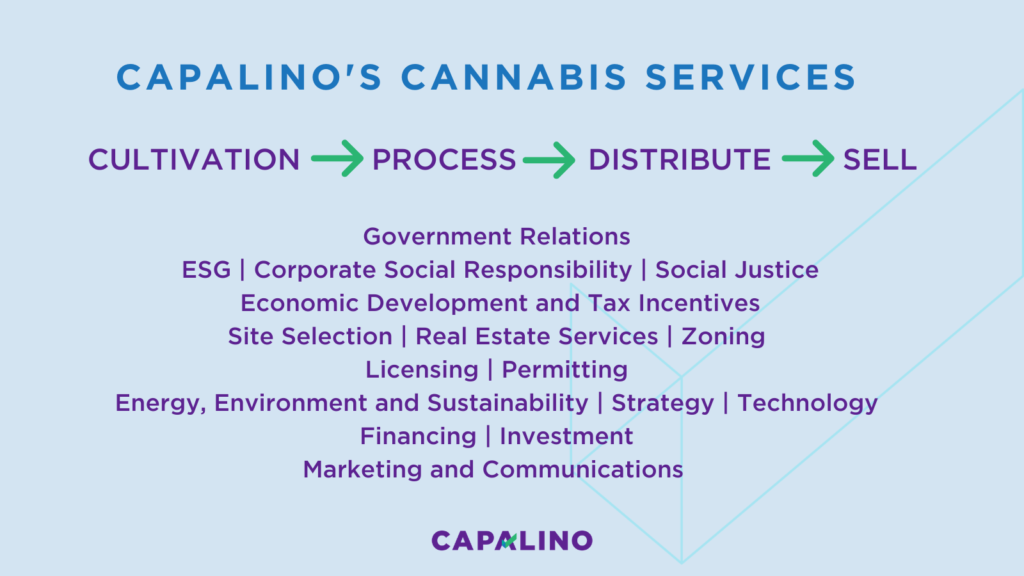
The Future of New York: Creating the State’s New Cannabis Industry

Written by Wendy Gerber, Chief Content Strategist, Capalino
All eyes are on New York: the world is watching the state roll out its newly legal cannabis industry. Cannabis companies, and those interested in entering the industry, are mobilizing to get their piece of the projected $3.7 billion in sales by 2025. Legalizing marijuana is encouraging news, especially as we recover from the COVID-19 pandemic and look for ways to drive both economic recovery and equity in New York.
Key Industry Leaders Share Insights
Leading urban strategy firm Capalino recently partnered with communications and strategy consultancy BPCM Cannabis on a dynamic program “Creating the State’s New Cannabis Industry” as part of Capalino’s “The Future of New York” program series.
Capalino convened forward-thinking experts across industry sectors to talk about the new cannabis market in New York, including: Imani Dawson, Executive Director, Cannabis Education Advocacy Symposium and Expo (CEASE); Melany Dobson, Chief Product Officer, Hudson Hemp; Lisa Gabor, Partner, BPCM Cannabis, David Hershkovits, Writer and Host, Light Culture Podcast; Kristin Jordan, Executive Director, Asian Cannabis Roundtable; Jeffrey Lee, Principal, Capalino (moderator); and Tunisha Walker-Miller, Principal, Capalino.
Impact of Legalization of Cannabis
The panelists had a lively and insightful discussion about the future of New York’s newest industry, including specifics of the new legislation and real possibilities coming out with new license types, new jobs, new business opportunities and new tax reinvestment into communities harmed by the war on drugs. The speakers discussed issues ranging from dispensary, on-site consumption and delivery licenses to cannabis’ impact on NYC’s clubs and nightlife, zoning issues, job opportunities, sustainability and social equity.
The legalization of cannabis in New York is a huge development—both economically and from an equity standpoint. Jeffrey Lee, Principal at Capalino and leader of the Cannabis Advisory Team, led the discussion by noting, “The new cannabis industry will bring many new business opportunities, as well as new tax reinvestment into communities harmed by the war on drugs.” He added that Capalino recently launched the Cannabis Advisory Team to help clients navigate the evolving regulatory and business landscape.
“Abraham Lincoln said ‘The best way to predict the future is to create it,’” noted David Hershkovits, Writer and Host, Light Culture Podcast. He emphasized that with all the retail store fronts closed, “I don’t think we could have had a better time for this legislation to pass because it will be an important part of New York’s economic recovery.” Hershkovits mentioned that there are already underground cannabis lounges now and the legislation will enable these lounges to come above ground. But he added, “There is still a lingering war on drugs and continued stigmatization and lots of education is needed.”
Developing the Cannabis Regulatory Landscape
The panelists noted that this legislation and its implementation is evolving and there are still many details of the program that need to be worked out, including regulatory, licensing and zoning requirements. Almost every other aspect of the 128-page, 7,000-line law will take effect over months or longer. The recreational cannabis program will not take effect for another year at least as dispensary and on-site consumption sales of marijuana cannot begin until April 1, 2022 at the earliest. Over the coming months, state officials will write the policies and guidelines that will affect many aspects of recreational cannabis use and business requirements.
Tunisha Walker-Miller, Principal at Capalino, noted “There are lots of moving parts that need to be put in place”. The legislation established the formation of the NYS Office of Cannabis Management (OCM), which is a new agency to tackle all the issues related to adult-use cannabis and medical use and will be monitored by a Cannabis Control Board. The OCM will oversee the licensure, cultivation, production, distribution, sale and taxation of medical, adult-use and cannabinoid hemp within New York State.
“We’re in a liminal space,” said Lisa Gabor, Partner, BPCM Cannabis, co-host of the program. “We know what will happen, but don’t know exactly how we’ll get there yet.” Since the recreational cannabis program will not take effect for another year, New York has time to create and cultivate a business industry that will drive revenue growth and open the door for job opportunities across all sectors.
Social Equity is a Key Component of NY’s Legalization
The legislation provides licensing for marijuana producers, distributors, retailers, and other actors in the cannabis market, and creates a social and economic equity program to encourage small businesses and minority businesses to participate in the industry. In addition, this legislation will attempt to address decades of harm resulting from the war on drugs through targeted investments and criminal justice reform.
Walker-Miller noted that the social equity program sets aside 50% of licenses for minorities and women. She added, “This will ensure diverse communities will be able to take part in this new industry.”
Dawson noted that the new cannabis program will help bring equity, access and economic opportunity to communities impacted by the war on drugs. She added that the New York legislation is a “gold standard” and the real opportunity is “to continue to advocate to ensure that the regulatory framework follows the spirit of the legislation.”
“Advocacy efforts provided the foundation for our legislation to be bold and build a brighter future in part to make up for the harms of the past,” Dawson explained. “It’s important that we give everyone a seat at the table.”
Kristin Jordan, Executive Director, Asian Cannabis Roundtable, added, “The law lists a goal of providing not less than 50% of licenses to communities impacted by the war on drugs—that’s just the benchmark—I hope we’ll strive to do better than that.”
New York’s Impact on the Cannabis Industry
From a commercial standpoint, New York functions as the anchor for the populous Northeast market. Influentially, few cities command the cultural clout of New York, given its homegrown creative industries and constant stream of tourists—all who will return home sharing the new ideas and speaking about the products they’ll experience during their memorable stay.
Gabor noted, “What excites me is that New York City will become a launchpad for the rest of the world. We have art, fashion and finance located in New York. We’ll see new products launched. We’re going to be the center of it all.” She added, “As one of the most populated and influential states in the country — and a financial center of the world — New York will have a tremendous impact on the cannabis industry.”
Cannabis Business Opportunities
The cannabis industry has the potential to create significant economic opportunities in New York State, generating substantial tax revenues, creating thousands of new jobs, and providing a much-needed boost for the upstate agricultural markets which will put New York on a level playing field with other states already benefiting from the cannabis industry. Once the plan is fully rolled out, tax revenues from the adult-use cannabis program are projected to reach $350 million annually. Additionally, there is the potential for this new industry to create 30,000 to 60,000 new jobs across the State.
The discussion also centered around the fact that this is not a new sector—there are legacy operators in the hemp space including Hudson Hemp. Melany Dobson, Chief Product Officer, Hudson Hemp, noted that the legacy market was built on trust and also secrecy, stating, “Now there’s an opportunity to replace trust with transparency and bring that trust forward into this new industry.”
Panelists noted that the prospects for cannabis and its economic impacts provide tremendous business and growth opportunities. Cannabis has to be grown, harvested, packaged, distributed and sold, which opens the door for organizations to enter the market in a variety of sectors. In New York, cultivation of cannabis will largely take place indoors due to the length of our growing season; however, Dobson also noted the importance of outdoor cultivation since it uses less resources and produces fewer greenhouse gas emissions and emphasized that farmers should add cannabis to their crop rotation.
With business opportunities ranging from agricultural cultivation to processing, distribution and retail sales, companies wanting to enter this market sector in New York State will need to navigate the ever-changing New York complex political and business landscape. This involves issues ranging from business strategy, real estate and site selection, to zoning, permitting, licensing, energy and sustainability, as well as technology and marketing. Businesses will need to check local regulations when they look to develop a cultivation facility.
Imani Dawson, Executive Director of the Cannabis Education Advocacy Symposium and Expo (CEASE) emphasized, “Even though the cultivation side touching the plant is attractive, the ancillary businesses are where the economic opportunities will be.”
Walker-Miller noted that retail, technology, transportation, security and marketing will all be key businesses. She added that delivery licenses will be big in New York as an opportunity for small businesses. Walker believes that local community banks will play a major role in financing cannabis businesses, noting that the regulatory regime around cannabis finance is evolving.
Moving Forward
Since the regulatory process is evolving, entrepreneurs and others interested in investing in the cannabis market should be cautious in considering the real estate components while some of the regulations are worked out. Capalino’s real estate team in partnership with other practice groups will use its extensive zoning, land use, permitting, and community engagement know-how to help identify qualifying sites and opportunities and to assist with successful approvals. This applies to the range of retail and other outlets, as well as locations for processing, warehousing, and distribution facilities.
In the interim, Jordan suggested figuring out what type of license you want, building a team, going to Community Board meetings, educating yourself and others, figuring out funding, developing a corporate structure, and thinking about an exit strategy.
Walker-Miller added that municipalities have until December 31, 2021 to opt out. She noted that Capalino will be keeping abreast of cannabis developments to better serve clients.
Capalino will be hosting another program focused on regulatory developments and how to navigate the evolving cannabis business landscape. Stay tuned at The Future of New York.
Capalino’s Cannabis Advisory Team
Capalino’s new Cannabis Advisory Team is advising businesses on how to tackle this new legislation and its complex regulatory requirements to maximize opportunities for market penetration and business growth. The Cannabis Advisory Team combines expertise in land use, permitting, business strategy, social responsibility and community engagement to help identify qualifying sites and opportunities and to assist with successful approvals. This applies to the range of retail and other outlets, as well as locations for processing, warehousing, and distribution facilities. Capalino will also help drive business strategy and address the social equity programs that are an integral part of this legislation.

Conclusion
This new cannabis legislation will have tremendous impact economically, culturally and socially. New York is undergoing a huge cultural shift now that marijuana is legal. The amount of new business opportunities across the sector is staggering and cannabis has the potential to change the face of New York’s retail landscape which will have major implications for the future of New York. The expected tax revenues will aid New York’s ability to recover from COVID-19 and the social equity component of this legislation will help to right the wrongs of the past. While there are many facets that still need to be finalized, New York is well on its way to creating a legal cannabis industry that’s sustainable, diverse, and inclusive for all.
Capalino is the leading urban strategy firm in New York. We help companies navigate the business, technology, real estate, environmental and political landscape, and our Cannabis Advisory Team advises businesses across all these areas. For help in developing a successful cannabis strategy, visit Capalino’s Cannabis Advisory Services or contact Jeffrey Lee, Principal at Capalino, at jeffrey@nullcapalino.com.


